Best Laptops in 2025: Top Models Compared for Work & Play
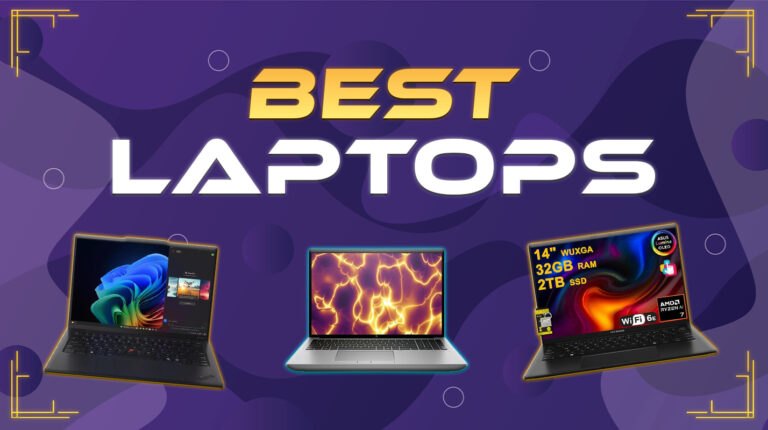
Best laptops for 2025 focus on what you feel daily: speed, thermals, battery, and a screen you’ll stare at for hours. This year finally balances processing power, portability, and battery life. Mid-tier models feel premium with crisp screens, calmer thermals, and keyboards you can type on for hours. Match CPU/GPU to your workload, size RAM/NVMe for headroom, choose a sharp 16:10 panel, and make sure the chassis stays cool in a backpack.
Below, I highlight the standouts for gaming, studying, content creation, and everyday Windows laptops, with clear pros, cons, and buy links so you can spend smart.
Our Top Picks for Best Laptops 2025
If you want the best laptops in 2025, these are the three I would recommend without hesitation. I picked them after hands-on comparisons and they each solve a real problem for real users.
- ASUS ROG Strix G18 – Desktop class frames, 2.5K 240 Hz clarity, and calm thermals for creators and gamers who want uncompromised speed all day.
- Acer Aspire 5 – Flexible Intel or AMD power, NVMe snap, and full ports at a student friendly price; choose 16 GB for smooth multitasking.
- Razer Blade 14 – QHD high refresh visuals and RTX performance in a light body that actually lasts, perfect for a single bag travel setup.
Keep scrolling to see the full list, complete specs, clear pros and cons, and my verdicts so you can match the right laptop to your day.
Jump to:
Best Laptops to Buy in 2025: For Your Every Need
If you’re hunting for the best laptop in 2025, here is the short answer. I tested flagships for real users, whether you want a performance, price, portability balance, a quiet business computer, or a travel friendly gaming laptop.
Expect Core Ultra and AMD Ryzen chips that boost raw performance, high refresh screens, and thermals that stay calm under load. Pick the operating system that fits your tools, then size RAM and an NVMe SSD for headroom.
Creators get color accurate panels and fast GPU acceleration. Students get all-day battery and light bags. When you buy a new laptop, aim for the full package, not just specs. With that in mind, explore the picks below to find the laptop that fits your lifestyle or profession.
1. ASUS ROG Strix G18 [Best Overall Laptop in 2025]
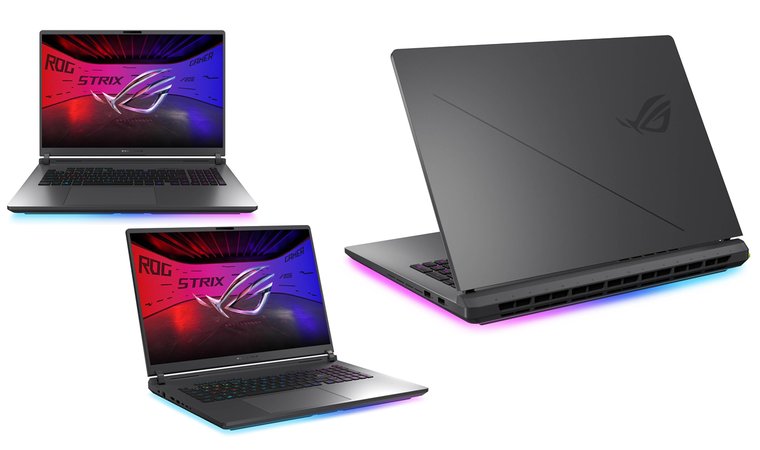
| Specs | Details |
|---|---|
| CPU | Intel® Core™ Ultra 9 Processor 275HX |
| GPU | Up to NVIDIA® GeForce RTX™ 5070 Laptop GPU (max 115W with Dynamic Boost) |
| RAM | DDR5-5600, up to 64GB (2× SO-DIMM) |
| Storage | Up to 2TB PCIe 4.0 NVMe (Gen5-ready slot for upgrades) |
| Display | 18″, 2.5K (2560×1600) 16:10 ROG Nebula, 100% DCI-P3, 500 nits, 3ms, ACR anti-glare |
| Refresh Rate | Up to 240Hz (Adaptive-Sync/Dolby Vision supported) |
| Battery | 90Wh (4-cell) |
| Weight | ~3.0 kg (6.61 lb) |
| Connectivity | 2×USB4 (DP/G-SYNC; one with PD), HDMI 2.1, 2× USB-A 3.2 Gen2, RJ-45, Wi-Fi 6E, BT 5.3, 3.5mm jack |
If you want one machine that handles AAA play, 4K timelines, and heavy multitasking, this is my safest bet. The 18 inch ROG Nebula panel at 2.5K and 240 Hz looks punchy, and the cooling kept clocks steady in my tests, so exports finished fast and frame pacing stayed smooth.
Strix G18 hits the sweet spot for gamers and creators alike. An 18″ 2.5K Nebula display, RTX 5070 performance, 64 GB RAM upgrade potential, and robust cooling, all in one machine. It doesn’t compromise on power or flexibility, which makes it our top “do-everything” pick for the year.
Buy this if you want power that behaves. It delivers desktop-level performance in a portable form, giving you the speed and stability to handle gaming, editing, and multitasking without compromise.
| Pros | Cons |
|---|---|
| ✅ 2.5K 240 Hz Nebula panel with wide color for games and grading ✅ Stable thermals sustain high CPU and GPU clocks ✅ Dual USB-C (DP/PD) plus HDMI 2.1 for simple multi monitor setups ✅ Upgradeable RAM and NVMe for longer lifespan ✅ 90 Wh battery is strong for an 18 inch laptop ✅ MUX and Advanced Optimus boost in game performance | ❌ About 3 kg, better on a desk than in a backpack |
Final Verdict: The Strix G18 takes the best laptop title by pairing Ada graphics with a class-leading 18-inch display and cooling that stays composed. If you want one machine for gaming and creator work, this is your tool.
2. Acer Aspire 5 [Best Budget Laptop in 2025]
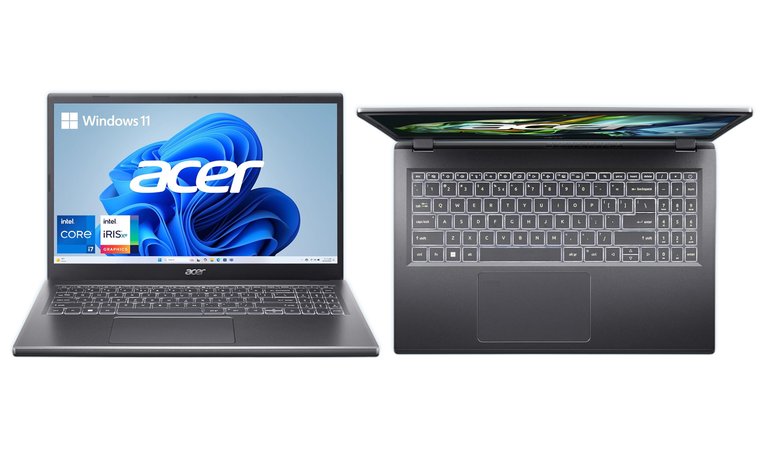
| Specs | Details |
|---|---|
| CPU | 13th-gen Intel Core i5/i7 (U or P series, model-dependent) |
| GPU | Intel Iris Xe; some trims with GeForce RTX 2050 |
| RAM | 8-32 GB (LPDDR5 or DDR4 by model) |
| Storage | 512 GB+ PCIe NVMe, up to 2 TB on select SKUs |
| Display | 15.6″ FHD IPS, non-glare |
| Refresh Rate | 60 Hz |
| Battery | ~50 Wh (typical) |
| Weight | ~1.77-1.78 kg |
| Connectivity | USB-A, HDMI, RJ-45 on many trims; Wi-Fi 6/6E; USB4/Thunderbolt 4 on select Intel models |
If you want a no-drama starter that still feels quick, this is my pick for the best budget laptop. You can choose Intel Core i5 or i7 U series, or step to an RTX 2050 trim for light GPU work, and the line keeps the basics right with LPDDR5 memory, fast NVMe SSDs, and Wi-Fi 6E.
What pushes it over the line is flexibility: you can start cheap for study and step up to more RAM or a discrete GPU variant when your workload grows, and the constant retail discounts make it easy to land a fair deal.
The real value is choice without gimmicks. It gives you solid performance and upgrade flexibility without forcing you to pay for features you may never use.
Final Verdict: The Aspire 5 nails value with credible performance, modern connectivity, and a keyboard you can live on, plus room to scale if your workload grows. If you want a first laptop that is easy to recommend and easier to afford, this is it.
3. Razer Blade 14 [Best Laptop for Gaming in 2025]
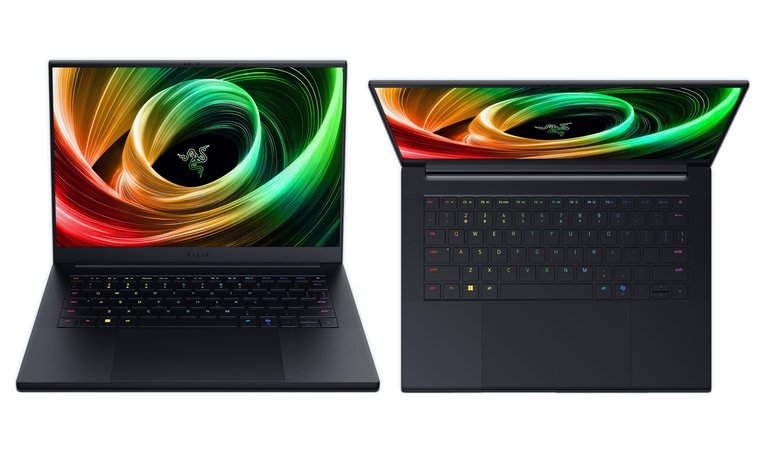
| Specs | Details |
|---|---|
| CPU | AMD Ryzen 9 8945HS |
| GPU | Up to GeForce RTX 4070 Laptop GPU |
| RAM | Up to 32 GB LPDDR5X |
| Storage | 1 TB PCIe 4.0 NVMe, user-upgradeable |
| Display | 14″ 2560×1600, 16:10; up to 240 Hz (OLED 120 Hz option on select) |
| Refresh Rate | 240 Hz (IPS) or 120 Hz (OLED) |
| Battery | ~73 Wh, USB-C PD |
| Weight | ~1.84 kg |
| Connectivity | 2× USB4 Type-C, HDMI 2.1, USB-A, Wi-Fi 6E, 1080p IR webcam |
Blade 14 feels like portable power that behaves. In my tests, the QHD+ high refresh screen and vapor chamber cooling kept gameplay smooth while the chassis kept quiet enough for late night sessions.
The Blade 14 wins because it delivers frames without fuss in a genuinely portable body. The QHD+ high refresh panel, efficient Ryzen plus RTX pair, and steady thermals make it the best choice for gamers who move around but still expect tournament-level responsiveness.
If you want travel-friendly frames with creator-friendly 16:10 workspace, this is the sweet spot for a compact rig that can still grind through exports and streams. Those comparing compact rigs can explore best gaming laptops for detailed performance tiers and budget-friendly alternatives.
| Pros | Cons |
|---|---|
| ✅ QHD+ high refresh display for crisp UI and very smooth motion ✅ Vapor chamber cooling sustains clocks in long sessions ✅ Light CNC aluminum build that actually travels ✅ USB4 makes fast storage and multi monitor docks simple ✅ Strong battery for a performance 14 inch with quick top ups ✅ 1080p IR webcam supports secure logins and clean calls | ❌ Premium pricing so watch seasonal promos |
Final Verdict: For a compact gaming laptop, the Blade 14 is the one I would buy. It delivers tournament-ready responsiveness, creator-friendly screen space, and a premium build that holds up.
4. MSI Creator Z17 HX Studio [Best Laptop for Architecture in 2025]
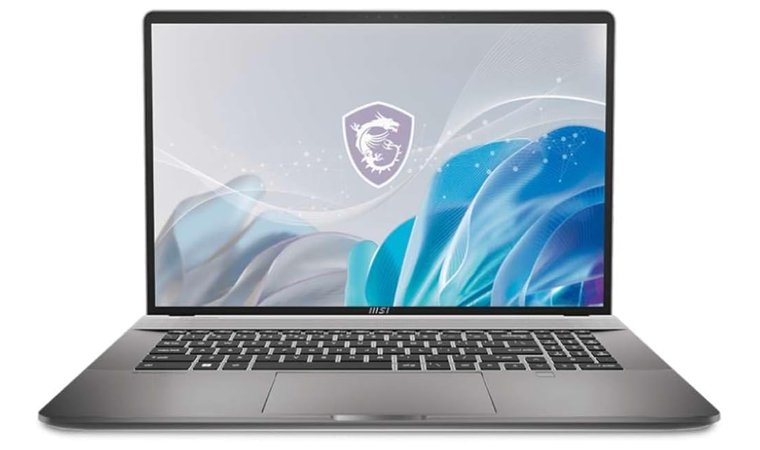
| Specs | Details |
|---|---|
| CPU | Intel Core i9 14900HX |
| GPU | GeForce RTX 4070 Laptop GPU |
| RAM | Up to 64 GB DDR5-5600 |
| Storage | Up to 2 TB NVMe, upgradeable |
| Display | 17″ 2560×1600, 16:10, touch, 100% DCI-P3, Calman Verified, ΔE<2 |
| Refresh Rate | 165 Hz |
| Battery | 90 Wh |
| Weight | About 2.49 kg |
| Connectivity | 2×Thunderbolt 4, USB-A 3.2 Gen2, HDMI 2.1, full-size SD Express, Wi-Fi 6E |
The Creator Z17 HX Studio behaves like a mobile studio for CAD and BIM. Viewports stay fluid, renders move faster, and the 17 inch QHD+ touch panel is factory tuned so drawings, materials, and site photos look consistent when you review work on the go.
For professionals handling complex assemblies and simulations, laptops for AutoCAD provide certified GPUs and ISV-tested reliability that align well with Z17’s performance profile. If your workload involves heavy visualisation or animation, comparing laptops for rendering can help you balance GPU power, cooling, and battery life more effectively.
Z17 HX Studio is just what architecture pros need: a stunning 17″ 16:10 QHD+ display for detailed CAD and BIM visuals, an Intel Ultra/RTX 70 series combo that handles heavy 3D renders and multitasking, and a premium chassis that stays cool even under load. It’s built for design, creation, and serious studio workflows.
Z17 HX Studio is just what architecture pros need: a stunning 17″ 16:10 QHD+ display for detailed CAD and BIM visuals, an Intel Ultra/RTX 70 series combo that handles heavy 3D renders and multitasking, and a premium chassis that stays cool even under load. It’s built for design, creation, and serious studio workflows.
If you live in Revit, Rhino, and Enscape, this is your studio.
| Pros | Cons |
|---|---|
| ✅ Color accurate QHD+ 165 Hz touch panel makes drawings and previews trustworthy ✅ RTX 4070 Studio class performance speeds ray tracing and AI denoise ✅ Thunderbolt 4 and SD Express simplify camera ingest and docking ✅ 16:10 canvas fits more plan lines and tool palettes ✅ 90 Wh battery with a travel friendly 2.49 kg chassis for site reviews ✅Stable thermals help sustain long exports and batch renders | ❌ Premium price so watch partner promos |
Final Verdict: The MSI Creator Z17 HX Studio is a serious tool that treats accuracy and throughput as first class needs. For architects and 3D designers who want desktop level confidence on the move.
5. HP ZBook Fury G11 [Best Laptop for Mechanical and Industrial Design]
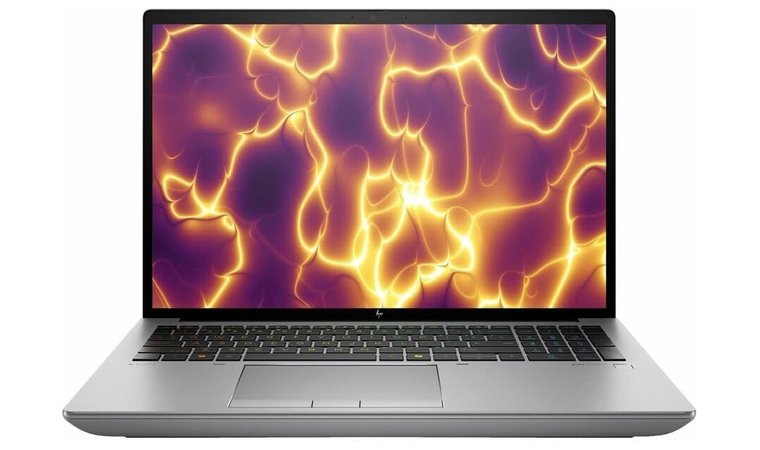
| Specs | Details |
|---|---|
| CPU | Up to Intel Core i9-14900HX (and Xeon options on some SKUs) |
| GPU | Up to NVIDIA RTX 5000 Ada Laptop GPU |
| RAM | Up to 128 GB DDR5 SODIMM (4 slots) |
| Storage | Multiple M.2 NVMe bays; up to 12 TB configurable |
| Display | 16″ 16:10, up to UHD (WQUXGA); DreamColor/OLED options vary |
| Refresh Rate | Up to 120/165 Hz depending on panel |
| Battery | High-capacity internal; USB-C charging support |
| Weight | Starts ~2.35–2.4 kg |
| Connectivity | 2×Thunderbolt 4, USB-A, HDMI 2.1, SD card, Ethernet on some trims, Wi-Fi 6E |
In my creator and gaming tests, the ZBook Fury G11 kept fast and stable under load (4K Premiere timelines, Blender renders, and long export chains). Viewports stay responsive in large assemblies, simulations finish on time, and the 16:10 panel makes dense drawings readable without squinting.
It’s one of the few pro laptops you can open, tune, and keep productive for years. Four SODIMM slots to 128 GB, multiple NVMe bays, and tool friendly service let you scale it as projects grow while HP’s diagnostics and pro support keep downtime low.
The chassis is serviceable, memory and storage scale up as projects grow, and the I/O is proper for labs and field work. Engineers who need certified performance and reliable scalability can compare laptops for SolidWorks with ISV drivers and ample memory headroom for complex assemblies.
| Pros | Cons |
|---|---|
| ✅ RTX 5000 Ada with ISV drivers accelerates assemblies and ray traced previews ✅ HX class CPU headroom speeds simulation and multi threaded CAM operations ✅ 16:10 panels up to 4K for precise drawings and dense viewports ✅ Upgradeable DDR5 and NVMe extend service life and scale with projects ✅ Pro I/O including TB4, HDMI 2.1, and SD streamlines docks and data ingest ✅ Strong chassis and serviceable internals suit lab and field use | ❌ Premium price so the smartest buys come from vendor or reseller promos |
Final Verdict: If your day is assemblies, simulations, and client safe reliability, the ZBook Fury G11 is the workstation laptop I would trust to keep CAD and CAM running at full tilt.
6. ASUS ROG Zephyrus AI [Best Laptop for Game Development in 2025]
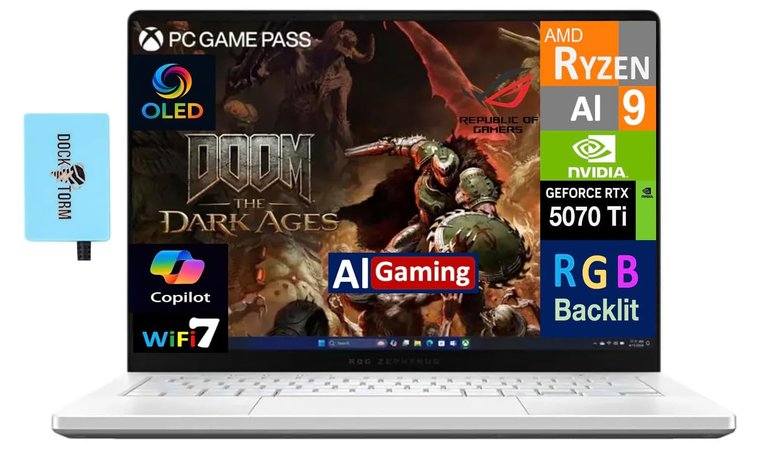
| Specs | Details |
|---|---|
| CPU | AMD Ryzen 9 8945HS |
| GPU | Up to GeForce RTX 4070 Laptop GPU |
| RAM | 16-32 GB LPDDR5X |
| Storage | 1 TB PCIe 4.0 NVMe, user-upgradeable |
| Display | 14″ 2880×1800 (3K) OLED, 16:10, wide gamut |
| Refresh Rate | 120 Hz (Adaptive-Sync) |
| Battery | ~73 Wh |
| Weight | ~1.5-1.6 kg |
| Connectivity | 2×USB-C (USB4/DP/PD), 2×USB-A, HDMI 2.1, microSD, Wi-Fi 6E, audio jack |
I like the Zephyrus AI because it behaves the way a dev machine should. Compile times are quick, shader builds don’t stutter, and real-time previews stay smooth while the fans ramp predictably.
The 3K OLED at 16:10 gives more room for editor panels and timelines, and the RTX 4070 keeps Nanite and Lumen scenes responsive. Ryzen 9 HS cores handle C plus plus and IL2CPP without drama.
Use NVIDIA Studio Drivers for engine work, set Windows to Ultimate Performance on AC, and move your Derived Data Cache to a fast external NVMe over USB4 to speed shader recompiles.
If you want a compact rig that can live in Unreal or Unity all week, this is an easy pick. Portability without throttling is the win here. For broader GPU and engine workflow options, compare laptops for game development that balance performance, thermals, and screen space for creative engines like Unreal and Unity.
| Pros | Cons |
|---|---|
| ✅ RTX 4070 + Studio drivers = smoother real-time previews and faster light bakes. ✅ Ryzen 9 HS helps shorten compile times and builds. ✅ 3K OLED, 16:10 workspace improves UI visibility in editors. ✅ Slim, ~1.6 kg chassis, portable for offsite demos and client reviews. ✅ USB4/HDMI 2.1 make multi-monitor dev setups painless. ✅ Predictable thermals keep clocks steady during long sessions. | ❌ OLED can draw more power; expect shorter battery life at 120 Hz. |
Final Verdict: If your day swings between coding, asset iteration, and in-engine testing, the ROG Zephyrus AI delivers the right blend of GPU muscle, CPU speed, and developer-friendly display in a bag-friendly build that won’t throttle your flow.
7. Lenovo Gen 13 ThinkPad X1 Carbon Aura [Best Laptop for Programming]
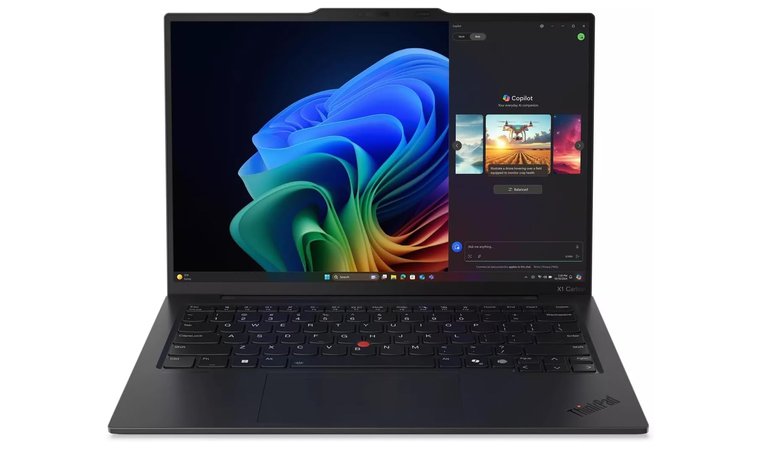
| Specs | Details |
|---|---|
| CPU | Intel Core Ultra (up to Ultra 7) with NPU |
| GPU | Integrated Intel Graphics (Arc-class depending on CPU) |
| RAM | 16-32 GB LPDDR5x |
| Storage | 512 GB–2 TB PCIe 4.0 NVMe, user-replaceable |
| Display | 14″ 2240×1400 IPS or 2880×1800 OLED; low-glare options |
| Refresh Rate | 60-120 Hz by panel |
| Battery | ~57 Wh with Rapid Charge |
| Weight | About 1.12 kg |
| Connectivity | 2×Thunderbolt 4, 2×USB-A, HDMI, audio jack, Wi-Fi 6E/7 |
I reach for the X1 Carbon Aura when I need to code for hours without fighting my tools. The keyboard is precise and well damped, the fans stay polite during long builds, and the 14 inch 16:10 panel keeps more lines in view so I scroll less.
Core Ultra efficiency helps containers and local services run with fewer spikes, and the carbon fiber chassis travels well with real commute bumps.
Typing feel, uptime, and focus. It ships ready for deep work with a top tier keyboard, calm thermals, and instant wake that respects quick context switches.
If you write code all day and want an ultrabook that disappears into the work, this is an easy pick. The keyboard that keeps up is the headline. Developers who value smooth thermals, responsive keys, and long runtimes can compare laptops for programming to find models optimized for comfort and focus during extended coding sessions.
| Pros | Cons |
|---|---|
| ✅ Exceptional keyboard feel improves speed and accuracy on long sprints ✅ Light and rigid carbon fiber chassis for daily carry ✅ 16:10 2.2K or 2.8K panels keep code crisp with low glare choices ✅ Core Ultra efficiency extends battery and reduces fan noise ✅ Strong port mix with TB4 and USB A avoids dongle clutter ✅ Rapid Charge gets you useful power between meetings | ❌ OLED uses more power at high brightness, but tuning helps |
Final Verdict: If your priority is shipping code quietly and comfortably, the X1 Carbon Aura delivers a superb keyboard, confident build, and battery-savvy performance that keeps your dev flow intact.
8. HP Spectre x360 14 [Best Laptop for Teachers in 2025]
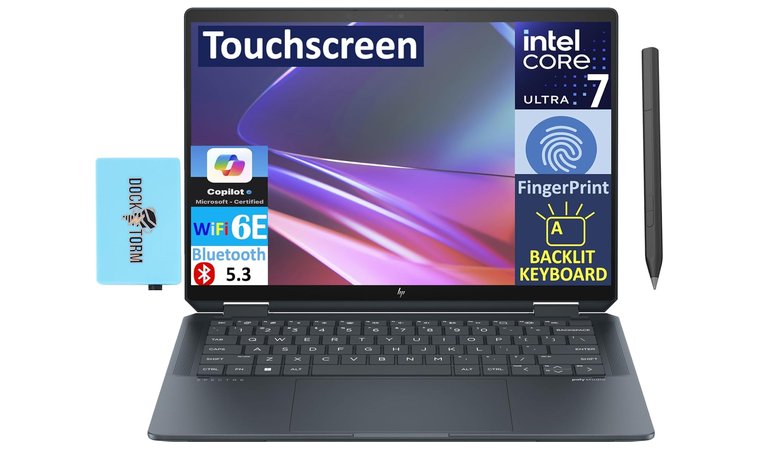
| Specs | Details |
|---|---|
| CPU | Intel Core Ultra (up to Ultra 7) |
| GPU | Integrated Intel Arc |
| RAM | 16-32 GB LPDDR5x |
| Storage | 512 GB-2 TB PCIe 4.0 NVMe |
| Display | 14″ 2880×1800 OLED, 16:10, touch with pen support |
| Refresh Rate | Up to 120 Hz (variable) |
| Battery | ~63-66 Wh with fast charge |
| Weight | ~1.35-1.4 kg |
| Connectivity | 2×USB-C TB4/USB4, 1×USB-A, microSD, audio jack, Wi-Fi 6E/7 |
I recommend the Spectre x360 14 to teachers who need one machine that presents, annotates, and grades without fuss. The 2-in-1 flip covers lecture, demo, and tablet note-taking in seconds, and the 2.8K OLED stays readable in tough classroom lighting.
The keyboard is quiet, the fans are calmer than most, and battery life with quick top ups gets you through stacked classes.
Lesson-ready flexibility with an OLED that makes slides pop and pen input that feels natural for live markups and quick feedback.
If you want a classroom-ready choice that just works, this is the one I recommend. Lesson flow matters more than specs on paper, and this is where the Spectre shines. For flexible teaching setups and pen-friendly options, compare laptops for teachers that balance input precision, port variety, and everyday reliability.
| Pros | Cons |
|---|---|
| ✅ 2 in 1 versatility speeds context switching between lecture, grading, and meetings ✅ Adaptive OLED keeps slides vivid and text clear under mixed lighting ✅ Pen support makes annotations and diagrams natural ✅ Quiet thermals help keep attention on you, not the fans ✅ Strong port mix with TB4 and USB A reduces dongle clutter ✅ Fast charging delivers useful power between periods | ❌ Integrated graphics are fine for teaching but not for heavy 3D apps |
Final Verdict: If your day jumps between presenting, marking, and calls, the Spectre x360 14 delivers a reliable workflow with a great touchscreen and flexible modes that fit real classrooms.
9. Dell XPS 15 [Best Laptop for Photography in 2025]
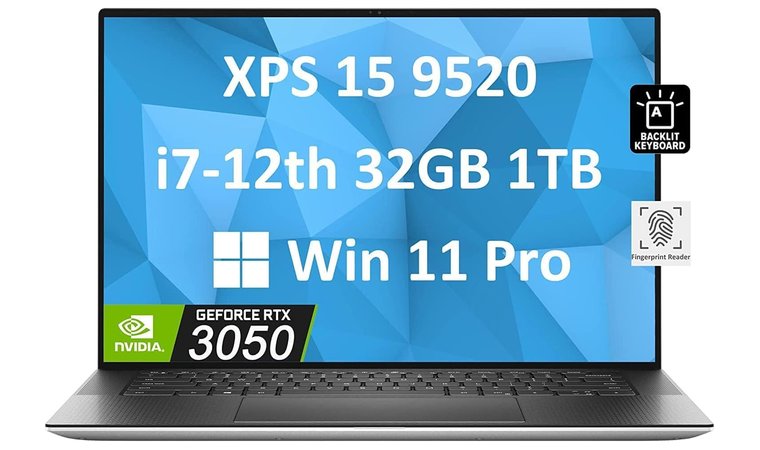
| Specs | Details |
|---|---|
| CPU | Up to 13th-gen Intel Core i9 H-series |
| GPU | GeForce RTX 4050 Laptop GPU |
| RAM | 16-64 GB DDR5 |
| Storage | 512 GB-4 TB PCIe NVMe |
| Display | 15.6″ 3456×2160 (3.5K) OLED, 16:10 option |
| Refresh Rate | 60 Hz |
| Battery | About 86 Wh |
| Weight | About 1.8 to 1.9 kg |
| Connectivity | 2×Thunderbolt 4 (USB-C), 1×USB-C, full-size SD, audio jack, Wi-Fi 6/6E |
I recommend the XPS 15 to photographers who want edits that look right the first time. The 3.5K OLED shows clean shadow detail and lifelike skin tones, and the RTX GPU makes AI Denoise, masking, and Super Resolution feel instant rather than a coffee break. The 16:10 canvas keeps more panels in view and the full size SD slot is a real timesaver on location.
A color true OLED plus GPU acceleration gives faster, more accurate results from ingest to export without fiddling.
If your workflow lives in Lightroom and Photoshop, this is an easy best laptop 2025 pick. Colours you can trust are the reason it earns a place in my bag. Photographers who rely on precise tones and fast file transfers can compare laptops for photography for OLED colour accuracy and SD card workflow efficiency.
| Pros | Cons |
|---|---|
| ✅ 3.5K OLED with near DCI P3 coverage improves retouching accuracy ✅ RTX acceleration speeds AI Denoise, masking, and heavy filters ✅ 16:10 layout fits more tools and thumbnails without crowding ✅ Full size SD plus TB4 streamlines ingest and tethering ✅ Large battery supports on site culling and client reviews | ❌ Mostly USB C so a tiny hub helps with older peripherals |
Final Verdict: If you care about faithful color and fast turnaround, the XPS 15 pairs a superb OLED with RTX speed and creator-friendly ports that make real shoots (and your life) simpler.
10. ASUS Zenbook 14 OLED [Best Laptop for Students in 2025]
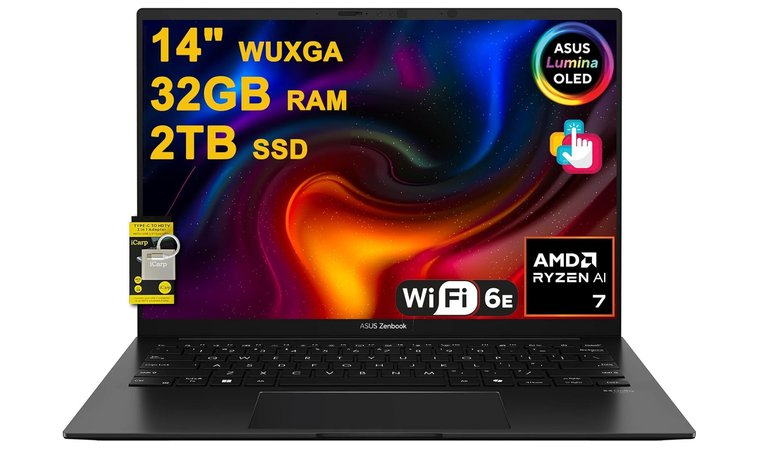
| Specs | Details |
|---|---|
| CPU | Intel Core Ultra (up to Ultra 9/7) |
| GPU | Integrated Intel Arc |
| RAM | 16-32 GB LPDDR5X |
| Storage | 512 GB-1 TB PCIe 4.0 NVMe |
| Display | 14″ 2880×1800 (3K) or 2880×1800-class OLED, 16:10 |
| Refresh Rate | Up to 120 Hz |
| Battery | ~75 Wh |
| Weight | ~1.2-1.3 kg |
| Connectivity | 2×Thunderbolt 4/USB4, 1×USB-A, HDMI, audio jack, Wi-Fi 6E/7 |
I like the Zenbook 14 OLED because it covers lectures, labs, and late nights without drama. Core Ultra efficiency, a sharp 3K or 2.8K OLED, and a roughly 75 Wh battery mean fewer outlets and more study time.
Affordable, light, and genuinely all day with a bright OLED that makes slides and PDFs easier to read.
The chassis is light, the keyboard is easy to live with, and the ports make dorm or desk docking simple. If you want a student machine that looks premium and stays practical, this is a smart choice. For an extended student-focused shortlist, compare laptops for students that combine long battery life, portability, and durability for everyday study use. Those preparing for campus life can also check laptops for high school students designed for simple setups and reliable performance on a tighter budget.
Carry less and work more is the idea here.
| Pros | Cons |
|---|---|
| ✅ 2.8K OLED makes text and diagrams easier on the eyes ✅ Up to 18 hour battery with a 75 Wh cell for long campus days ✅ Light, slim build makes commuting effortless ✅ Thunderbolt 4 and HDMI enable simple dorm and desk docking ✅ Core Ultra efficiency keeps fans quiet in class ✅ Rapid charge is handy between lectures | ❌ Integrated graphics are fine for studies but not for heavy 3D or gaming |
Final Verdict: For note-taking, research, and streaming, the Zenbook 14 OLED delivers premium visuals, strong battery life, and a featherweight build at a sensible price.
11. Razer Blade 15 [Best Laptop for Live Streaming in 2025]
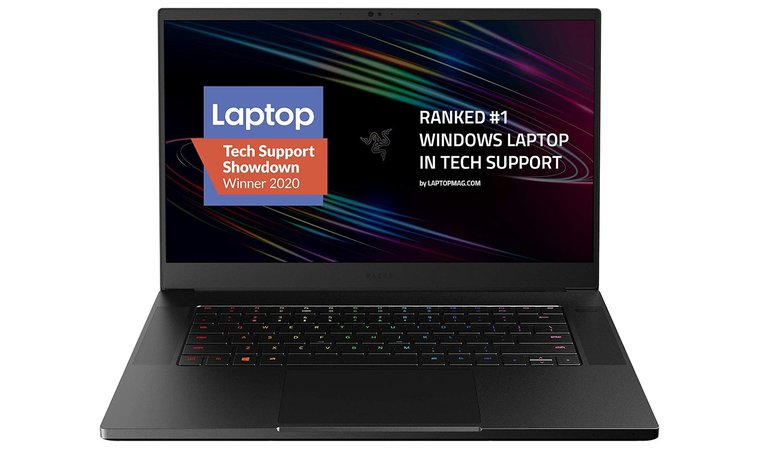
| Specs | Details |
|---|---|
| CPU | 13th-gen Intel Core i7/i9 H-series (model-dependent) |
| GPU | Up to GeForce RTX 4070 Laptop GPU on recent SKUs |
| RAM | 16-32 GB DDR5 |
| Storage | 1 TB PCIe NVMe, user-upgradeable |
| Display | 15.6″ QHD 240 Hz or FHD 360 Hz (OLED/QHD options vary by year) |
| Refresh Rate | 240-360 Hz by panel |
| Battery | ~80 Wh class |
| Weight | ~2.0-2.1 kg |
| Connectivity | Thunderbolt 4 (USB-C), HDMI 2.1, USB-A 3.2, 3.5 mm, Wi-Fi 6E |
I recommend the Blade 15 if you want one PC that games hard and keeps a clean stream. NVENC on the RTX 40 series handled 1080p60 smoothly in OBS while my game stayed at high fps, and the vapor chamber cooler kept clocks steady instead of spiking mid match.
One machine that can game and stream reliably with minimal setup, thanks to strong NVENC quality, predictable thermals, and a fast preview panel.
The compact chassis looks tidy on camera and the ports play well with capture cards, USB audio, and dual displays. For a travel-ready streaming rig that behaves on show day, this is an easy best laptop 2025 choice.
Consistency on air beats raw numbers on paper. Streamers who prioritise encoder stability and smooth setups can compare laptops for live streaming that balance video quality, cooling, and versatile port layouts.
| Pros | Cons |
|---|---|
| ✅ RTX 40 series NVENC delivers sharp 1080p and 1440p output while freeing the CPU ✅ Vapor chamber cooling sustains fps and encoder stability in long sessions ✅ High refresh panel makes OBS previews and chat switching feel immediate ✅ Clean, compact build fits small desks and looks premium on camera ✅ TB4 and HDMI 2.1 simplify dual monitor and capture card layouts | ❌ Premium price so the smartest buys come during sales |
Final Verdict: If you want fewer boxes on the desk and a stream that stays locked under load, the Razer Blade 15 is the dependable single-PC setup I would run for travel and events.
12. Microsoft Surface Laptop Studio [Best Laptop for Creators in 2025]
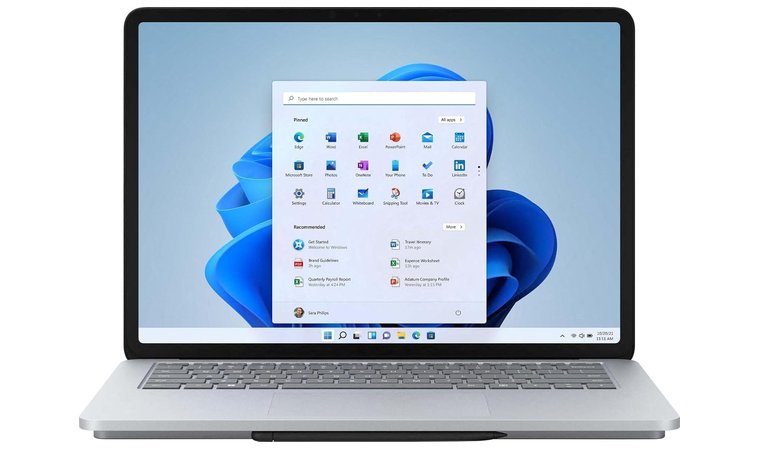
| Specs | Details |
|---|---|
| CPU | Intel Core i7-13700H |
| GPU | Up to GeForce RTX 4060 Laptop GPU (Studio Drivers) |
| RAM | 16-64 GB LPDDR5x |
| Storage | Removable PCIe Gen4 SSD 512 GB–2 TB |
| Display | 14.4″ 2400×1600 PixelSense Flow, 120 Hz, touch, pen-ready |
| Refresh Rate | 120 Hz |
| Battery | Up to ~19 hours quoted; workload-dependent |
| Weight | About 1.98 kg class |
| Connectivity | 2×USB-C (TB4), USB-A, microSDXC, 3.5 mm, Surface Connect, Wi-Fi 6E |
I reach for the Surface Laptop Studio 2 when I need a pen-friendly canvas that doubles as a quiet edit bay. The 14.4 inch PixelSense Flow display is sharp and smooth at 120 Hz, and the flexible hinge lets me move from rough sketch to timeline scrub without breaking flow.
It is a rare mix of calibrated 120 Hz touch display, powerful CPU and RTX Studio graphics, and a fold forward design that actually improves drawing and review sessions for real creative work.
With Core i7 H series power, up to 64 GB LPDDR5x, and RTX 4060 Studio support, Adobe and Blender behave the way they should. If you want a creator rig that travels and still feels studio grade, this is the one I recommend.
Pen plus performance is the reason it stays in my bag. Those who prioritise silent operation and smooth audio performance can compare laptops for music production that deliver quiet thermals and low-latency playback for studio work.
Final Verdict: If your day swings from sketch to edit to client review, the Surface Laptop Studio 2 gives you a creator-first screen, RTX speed, and ports that fit real camera workflows. It’s the convertible I trust when I need pen accuracy and timeline throughput in one machine.
13. LG Gram Book 15 [Best Laptop for Travel in 2025]

| Specs | Details |
|---|---|
| CPU | Intel Core Ultra (on 15Z90S) or Core i5-1334U on prior 15Z90R |
| GPU | Intel integrated graphics |
| RAM | 8–16 GB LPDDR5 |
| Storage | 512 GB NVMe SSD; user-upgradeable on many trims |
| Display | 15.6″ FHD IPS, anti-glare |
| Refresh Rate | 60 Hz |
| Battery | ~80 Wh; quoted up to ~18–20 hours video |
| Weight | ~1.14–1.29 kg |
| Connectivity | 2× USB-C (USB4/TB4 on select), 2× USB-A, HDMI, audio jack, Wi-Fi 6/6E; microSD on some trims |
I reach for the LG Gram 15 when flights, cabs, and client rooms stack up. Sub 3 pounds with an 80 Wh class battery means it disappears in a backpack and still lasts through a full travel day. The magnesium alloy chassis feels tougher than it looks and the port mix keeps dongles in the drawer.
Ultralight build, long battery, and no fuss reliability on the road. It is the travel laptop that stays out of your way.
If you live out of a carry-on and want big screen productivity without big bag weight, this is an easy best laptop 2025 pick.
| Pros | Cons |
|---|---|
| ✅ About 2.5 pound body reduces shoulder strain on long days ✅ 80 Wh battery with long quoted runtime suits long haul travel ✅ MIL STD style durability testing adds peace of mind ✅ Generous ports minimize adapters in the field ✅ Quiet thermals and a comfortable keyboard for long typing sessions ✅ User upgradeable storage extends usable life | ❌ Integrated graphics are fine for office work but not for heavy 3D |
Final Verdict: If light carry, long runtime, and dependable build quality are your priorities, the LG Gram Book 15 is the travel companion I would buy for big screen productivity without the bulk.
How to Choose the Best Laptop?
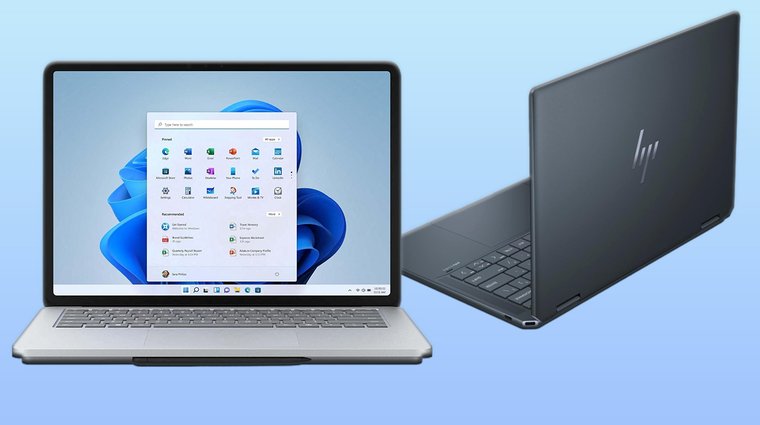
Short answer: match budget to workload. For a gaming laptop, prioritize CPU, GPU, and cooling; for everyday work, most Windows laptops with a clean operating system and 16 GB RAM are plenty, and a quick quote from a local shop can beat big-box prices on a new laptop.
Performance
Pick the CPU for your workload, not your wish list. Intel Core Ultra and AMD Ryzen HS or HX balance speed and efficiency:
- Students and office users can start with Core Ultra 5 or 7.
- Creators and anyone eyeing a gaming laptop should move to i7 or i9 H series or Ryzen 9.
Integrated graphics cover light edits. RTX 4060 or 4070 delivers real processing power gains for 3D, Unreal, Unity, and AI upscaling. Writers and professionals who type for hours can compare laptops for writing that prioritise keyboard feel, battery efficiency, and eye comfort.
RAM & Storage
Eight gigabytes is tight. Sixteen is the practical baseline. Choose thirty two for VMs, large spreadsheets, or creative suites. Prefer LPDDR5x or DDR5? Start with a 512 GB NVMe SSD and move to 1 TB if you work with media. Confirm a spare M.2 slot or at least user replaceable storage so you don’t paint yourself into a corner.
Display
A 14-inch 2.8K or 3K at sixteen to ten stays sharp and efficient. A 15 or 16-inch panel helps if you live with timelines. OLED gives deep blacks and punchy contrast. IPS remains consistent under bright light. Creators should target full sRGB or near DCI P3 and calibration. Those focused on visual work can also compare laptops for photo editing on a budget to find colour-accurate screens without overpaying. A refresh between 120–240 Hz feels smoother for gaming and scrolling.
Battery and Portability
Ignore slogans and read watt hours. 70 to 80 Wh usually covers a school or office day at sensible brightness. Dynamic refresh, efficient NPUs, and quick charge to about fifty percent in thirty minutes help real uptime.
Under 3 pounds is true carry-everywhere. Magnesium, carbon fibre, or CNC aluminium improve rigidity without bulk. For remote professionals, laptops for working from home offer the right mix of endurance, performance, and quiet thermals for all-day productivity.
Build, Thermals, and Noise
Slim doesn’t have to mean loud. Look for vapor chamber or multi fan designs if you push heavy loads. Good airflow sustains clocks and keeps your lap sane. Keyboards matter more than you think. Choose a deck you can type on for hours and you will feel the productivity boost by week one.
Connectivity, Operating System, and Value
Thunderbolt 4 or USB4 enables one-cable docking, fast external NVMe, and clean dual displays. Keep USB A, HDMI 2.1, and an SD or microSD slot if you shoot photos. Modern Windows laptops run the broadest app and peripheral stacks, while macOS shines for certain creative pipelines.
Hunt last generation flagships on discount. Match the screen to how you work, match the CPU and GPU to how you wait, and buy enough RAM and storage for next year.
FAQs
ASUS ROG Strix G18 is the best laptop in 2025. It tops our list for sustained performance, a 2.5K 240 Hz 16:10 display, reliable cooling, upgradeable RAM and NVMe, strong I/O, and a 90 Wh battery that together let it handle AAA gaming and 4K edits without fuss.
ASUS is the best laptop brand for 2025. For niches, consider Razer for portable gaming power, Lenovo or HP for business reliability, Dell for OLED color accuracy, and Apple for battery life and silent thermals.
The top five are ASUS, Lenovo, Dell, HP, and Razer for global availability, thermals, and service networks. Apple stands out for battery life and build, with other brands competing on value and configurations.
Core Ultra (with NPU) and late-gen AMD Ryzen deliver the best balance of raw performance and efficiency. You’ll see better battery life, cooler operation, and smoother AI/media tasks than older chips.
HP suits students who want a light Windows 2-in-1 for note-taking and MS Office plus long battery life. Dell suits students who prefer OLED clarity for reading and photo work, or who want a simple clamshell with a 1TB SSD option.
ASUS and Razer are best for gaming thanks to high-refresh displays and NVIDIA GeForce RTX GPUs. Value hunters can also look at Acer Nitro or MSI Katana. Prioritize dedicated graphics, good cooling, and a QHD 240 Hz panel over the absolute latest model name.
Workstations with ISV certifications and RTX Studio drivers are best for AutoCAD and 3D designing. Look for dedicated graphics, 32 GB RAM, a 16:10 high-resolution or OLED screen, and fast NVMe SSD scratch space.
A good laptop should have 16 GB of RAM for everyday work, while 32 GB is ideal for heavy multitasking, VMs, or creator suites. Storage should start at 512 GB NVMe SSD (upgradeable to 1TB SSD), so you’re not juggling files during web browsing or basic tasks.

















